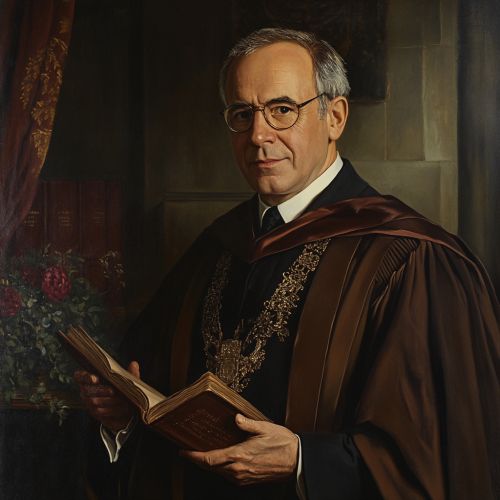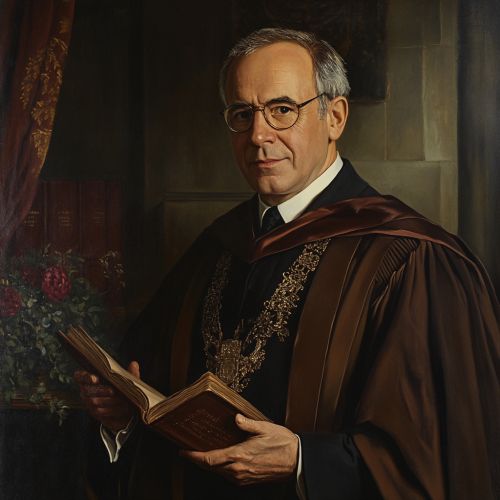Franz Ernst Neumann: Difference between revisions
(Created page with "== Early Life and Education == Franz Ernst Neumann was born on September 11, 1798, in Joachimsthal, Brandenburg, in the Kingdom of Prussia. His early education was marked by a strong interest in the natural sciences, which he pursued with vigor. Neumann's academic journey began at the University of Berlin, where he initially studied theology. However, his passion for the natural sciences led him to switch his focus to mathematics and physics. He later transferred to the...") |
No edit summary |
||
| Line 27: | Line 27: | ||
His contributions to crystallography, mineralogy, and physics have had a lasting impact on these fields, and his work continues to be studied and built upon by scientists today. Neumann's dedication to the pursuit of knowledge and his pioneering research have earned him a place among the most respected scientists of the 19th century. | His contributions to crystallography, mineralogy, and physics have had a lasting impact on these fields, and his work continues to be studied and built upon by scientists today. Neumann's dedication to the pursuit of knowledge and his pioneering research have earned him a place among the most respected scientists of the 19th century. | ||
[[Image:Detail-97517.jpg|thumb|center|Portrait of Franz Ernst Neumann in his later years, wearing academic robes and holding a book.|class=only_on_mobile]] | |||
[[Image:Detail-97518.jpg|thumb|center|Portrait of Franz Ernst Neumann in his later years, wearing academic robes and holding a book.|class=only_on_desktop]] | |||
== See Also == | == See Also == | ||
Latest revision as of 12:26, 7 August 2024
Early Life and Education
Franz Ernst Neumann was born on September 11, 1798, in Joachimsthal, Brandenburg, in the Kingdom of Prussia. His early education was marked by a strong interest in the natural sciences, which he pursued with vigor. Neumann's academic journey began at the University of Berlin, where he initially studied theology. However, his passion for the natural sciences led him to switch his focus to mathematics and physics. He later transferred to the University of Königsberg, where he studied under the tutelage of prominent scientists such as Carl Friedrich Gauss and Friedrich Wilhelm Bessel.
Academic Career
Neumann's academic career was distinguished by his contributions to various fields, including crystallography, mineralogy, and physics. In 1826, he earned his doctorate from the University of Königsberg with a dissertation on the optical properties of crystals. This work laid the foundation for his future research in crystallography.
In 1828, Neumann was appointed as an associate professor at the University of Königsberg, where he later became a full professor in 1834. His lectures on theoretical physics and mineralogy attracted students from across Europe, and his research significantly advanced the understanding of crystalline structures and their physical properties.
Contributions to Crystallography
Neumann's work in crystallography was groundbreaking. He developed the concept of the Neumann Principle, which states that the symmetry of a physical property of a crystal must include the symmetry elements of the crystal's point group. This principle has become a cornerstone in the study of crystallography and has been instrumental in the analysis of crystal structures.
Neumann also made significant contributions to the understanding of pyroelectricity, the property of certain crystals to generate a temporary voltage when heated or cooled. His research in this area helped to elucidate the relationship between crystal symmetry and physical properties.
Contributions to Mineralogy
In the field of mineralogy, Neumann's work was equally influential. He conducted extensive research on the physical properties of minerals, particularly their optical and thermal behaviors. His studies on the specific heat of minerals provided valuable insights into their thermal properties and contributed to the development of thermodynamics.
Neumann's research on the elasticity of minerals also advanced the understanding of their mechanical properties. He developed mathematical models to describe the elastic behavior of crystalline materials, which have been widely used in the study of mineral mechanics.
Contributions to Physics
Neumann's contributions to physics were diverse and impactful. He is perhaps best known for his work on the Neumann's law, which describes the relationship between the specific heat of a substance and its temperature. This law has been fundamental in the study of thermodynamics and heat transfer.
In addition to his work on specific heat, Neumann made significant contributions to the field of electromagnetism. He developed mathematical models to describe the behavior of electric and magnetic fields, which have been instrumental in the development of Maxwell's equations. His research in this area laid the groundwork for the modern understanding of electromagnetic theory.
Later Life and Legacy
Neumann continued to teach and conduct research at the University of Königsberg until his retirement in 1876. He remained active in the scientific community, publishing numerous papers and contributing to the advancement of various fields. Neumann passed away on May 23, 1895, leaving behind a legacy of scientific achievement and innovation.
His contributions to crystallography, mineralogy, and physics have had a lasting impact on these fields, and his work continues to be studied and built upon by scientists today. Neumann's dedication to the pursuit of knowledge and his pioneering research have earned him a place among the most respected scientists of the 19th century.


